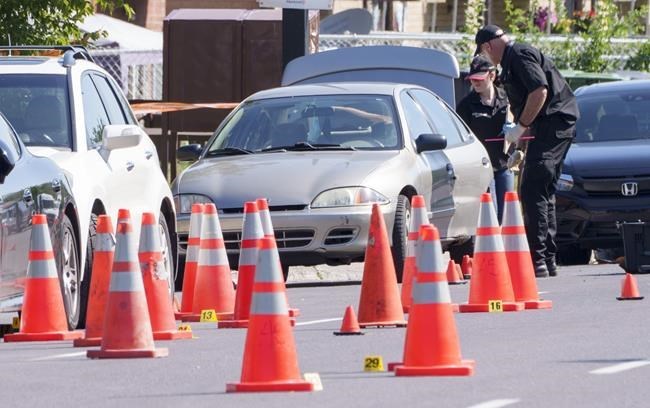MONTREAL — As police in the Montreal area deal with a jump in gun violence linked to street gang clashes, community workers are calling for decision makers to focus on the root of the problem.
This week, representatives of community groups that work with Black youth across the city gathered at an east-end park to announce the launch of Coalition Pozé, created to fight gun violence and push for an end "to three decades of failure with the repressive approach."
One longtime youth worker described the situation as critical.
"It's a community that has solutions, but it's sadly not always listened to," Pierson Vaval, director of Equipe RDP, told the gathering. "Sadly, it’s not always taken seriously, and sadly, (it's) often invisible at the decision-making table."
Shootings have become more common since last fall, and this month there has been a bloody surge that included three men killed Aug. 2 in a brazen daylight shooting in Rivière des Prairies, in northeastern Montreal. Three days later, Joas Jean-Baptiste, 31, was gunned down at his home in Longueuil, just south of the city.
The latest victim on Aug. 8 was identified by Quebec's coroners office as Wolf Duckerns Pierre Clermont, 22, gunned down in the city's north central Villeray district.
Pierre Clermont was a local rap artist known under the name Jeune Loup (Young Wolf), who had gained acclaim locally as a rising star. In an article from The Society of Composers, Authors and Music Publishers of Canada (SOCAN), he was listed as one of five Quebec rap artists to watch in 2021.
The spate of deaths has led to local and provincial police collaborating to stem the violence. Coalition Pozé says beefing up police forces after an increase in violence might score political points, but it ignores the root problem.
Beverley Jacques, who runs a sports organization in Montreal's St-Léonard neighbourhood that is part of the coalition,said lawmakers need to consult community groups regularly, not just when there's a crisis.
“When things go sour, suddenly they know where to find you, suddenly the want to talk to you, suddenly they want to have that conversation,” Jacques said in an interview.
He said youth are talented and creative ,and it's about harnessing that part of their lives early on to stop them from falling into a gang life. Jacques said a seat at the decision-making table, stable funding and recognition are what these groups are looking for.
“If we shut (our) door down, then it’s a chance for (youth) to find another chance we don’t want them to take,” Jacques said.
One criminologist said she doesn't believe the street-gang violence will be subsiding any time soon.
"It's a war, not just between the Crips and the Bloods, but there's also a conflict within the Bloods," said criminologist Maria Mourani, a former MP. "We have numerous gangs that are fighting, and this is the result."
Accentuating the complicated fight over power is the impulsive way the gangs operate. "In gangs, they shoot whenever, however, wherever," she said. "If they need to settle something, they settle it."
Guy Ryan, a retired Montreal police commander, said it will take some solid intelligence to prevent such acts, as the majority of victims don't co-operate.
Ryan believes the killing of a leading organized crime figure on Canada Day in Kanesatake, a Mohawk community north of Montreal, ignited the current violence.
"There were 20 incidents in July, we've had another four in August and that's a lot," Ryan said. "One thing is sure, these are people without scruples, spontaneous, unpredictable."
The shootings in recent weeks have taken place at all hours and in a variety of locations, creating a sentiment of insecurity for those who live in affected neighbourhoods.
They also create a lasting trauma among youth, something that doesn't get talked about enough, the coalition says.
Jacques said watching kids he's coached or known growing up fall into violence is hard. For youth workers, it leads to questioning: what more could they have done?
“In our streets we’re suffering, we’re losing kids that we know, family members, friends,” Jacques said. “If that doesn’t hit home, I don’t know what will.”
This report by The Canadian Press was first published Aug. 14, 2021.
Sidhartha Banerjee, The Canadian Press



